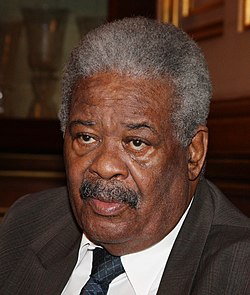Results
The NDP's victory was largely as a result of sweeping all four of the At-large seats. However, with each voter being able to cast four votes per ballot, the margin between the bottom NDP candidate (Paul Wattley) and the top VIP candidate (Reeial George) was a mere 41 votes, out of a total of 7,351 ballots cast (a margin of 0.5%). The other key win for the NDP was in the Fifth District where Delores Christopher carried the seat for the NDP by a wafer thin margin of just 3 votes in a constituency where a total of 20 ballots were rejected by elections officers.
Voters exercised a largely binary choice between the two main parties. No third party candidate or independent polled well in any area. In the Territorial seats, Alred Frett in the Fifth District was the highest vote-getter, with a mere 7.1% of the votes. In the At-large seats, the top eight spots went to the four candidates for each of the two main parties, with a massive drop off in numbers of votes for the ninth place candidate (Conrad Maduro, a former elected representative on the United Party ticket).
| Party | District | At-large | Total
seats | +/– |
|---|
| Votes | % | Seats | Votes | % | Seats |
|---|
| National Democratic Party | 3,390 | 46.59 | 4 | 15,295 | 52.39 | 4 | 8 | +3 |
| Virgin Islands Party | 3,799 | 52.21 | 5 | 12,325 | 42.22 | 0 | 5 | –2 |
| United Party | | 590 | 2.02 | 0 | 0 | 0 |
| Independents | 87 | 1.20 | 0 | 984 | 3.37 | 0 | 0 | 0 |
| Speaker and Attorney General | | | 2 | 0 |
| Total | 7,276 | 100.00 | 9 | 29,194 | 100.00 | 4 | 15 | 0 |
|
| Valid votes | 7,276 | 98.75 | | 7,336 | 99.80 | | |
|---|
| Invalid/blank votes | 92 | 1.25 | | 15 | 0.20 | | |
|---|
| Total votes | 7,368 | 100.00 | | 7,351 | 100.00 | | |
|---|
| Registered voters/turnout | 10,184 | 72.35 | | 10,180 | 72.21 | | |
|---|
| Source: Elections in the Virgin Islands |
District seats
4th District| Candidate | Party | Votes | % |
|---|
| Mark Vanterpool | Virgin Islands Party | 511 | 60.26 |
| Audley Maduro | National Democratic Party | 337 | 39.74 |
| Total | 848 | 100.00 |
|
| Valid votes | 848 | 98.60 |
|---|
| Invalid/blank votes | 12 | 1.40 |
|---|
| Total votes | 860 | 100.00 |
|---|
| Registered voters/turnout | 1,172 | 73.38 |
|---|
8th District| Candidate | Party | Votes | % |
|---|
| Lloyd Black | National Democratic Party | 458 | 58.87 |
| Ray George | Virgin Islands Party | 320 | 41.13 |
| Total | 778 | 100.00 |
|
| Valid votes | 778 | 98.86 |
|---|
| Invalid/blank votes | 9 | 1.14 |
|---|
| Total votes | 787 | 100.00 |
|---|
| Registered voters/turnout | 1,010 | 77.92 |
|---|
At-large seats
| Candidate | Party | Votes | % |
|---|
| Orlando Smith | National Democratic Party | 4,300 | 14.73 |
| Ronnie W. Skelton | National Democratic Party | 4,165 | 14.27 |
| Eileene Parsons | National Democratic Party | 3,515 | 12.04 |
| Paul P. Wattley | National Democratic Party | 3,315 | 11.36 |
| Reeial George | Virgin Islands Party | 3,274 | 11.21 |
| Irene Penn-O'Neal | Virgin Islands Party | 3,157 | 10.81 |
| Elvis Harrigan | Virgin Islands Party | 3,128 | 10.71 |
| Roy Pickering | Virgin Islands Party | 2,766 | 9.47 |
| Conrad Maduro | BVI United Party | 590 | 2.02 |
| John I. Cline | Independent | 450 | 1.54 |
| Henry Einstein Kettle | Independent | 220 | 0.75 |
| Richard Courtney de Castro | Independent | 172 | 0.59 |
| Eileene E. Baronville | Independent | 142 | 0.49 |
| Total | 29,194 | 100.00 |
|
| Valid votes | 7,336 | 99.80 |
|---|
| Invalid/blank votes | 15 | 0.20 |
|---|
| Total votes | 7,351 | 100.00 |
|---|
| Registered voters/turnout | 10,180 | 72.21 |
|---|
This page is based on this
Wikipedia article Text is available under the
CC BY-SA 4.0 license; additional terms may apply.
Images, videos and audio are available under their respective licenses.

